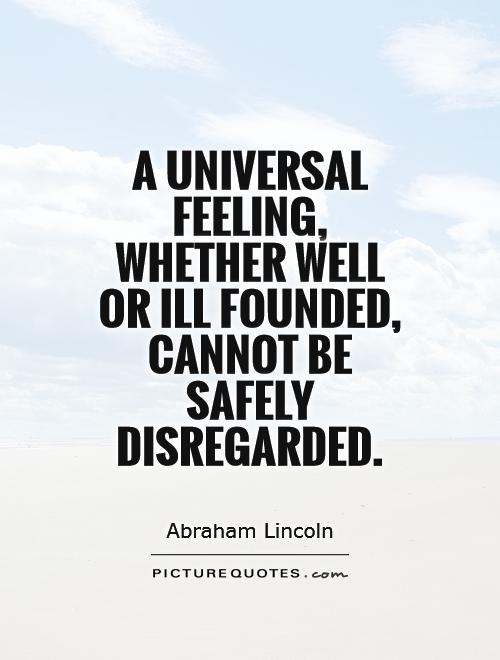A universal feeling, whether well or ill founded, cannot be safely disregarded

A universal feeling, whether well or ill founded, cannot be safely disregarded
Abraham Lincoln, the 16th President of the United States, is often regarded as one of the greatest leaders in American history. His leadership during the Civil War and his efforts to abolish slavery have solidified his place in the hearts of many Americans. One of the key aspects of Lincoln's leadership was his ability to understand and empathize with the feelings of the people he served. He recognized that a universal feeling, whether well or ill founded, cannot be safely disregarded.Lincoln's understanding of this principle was evident in his approach to the issue of slavery. While many in the South believed that slavery was a necessary institution, Lincoln recognized that the universal feeling among many in the North was that slavery was morally wrong. Despite the fact that the feelings on this issue were deeply divided, Lincoln understood that the universal feeling against slavery could not be disregarded. This led him to issue the Emancipation Proclamation, which declared that all slaves in Confederate-held territory were to be set free.
Lincoln's ability to recognize and respond to universal feelings was also evident in his leadership during the Civil War. Despite facing immense pressure and criticism from both sides of the conflict, Lincoln remained steadfast in his commitment to preserving the Union. He understood that the universal feeling among the American people was a desire for unity and peace, and he worked tirelessly to achieve that goal.
In his famous Gettysburg Address, Lincoln spoke of a "new birth of freedom" for the United States. He understood that the universal feeling among the American people was a desire for a more perfect union, where all men are created equal. By acknowledging and responding to this universal feeling, Lincoln was able to inspire and unite the nation during one of its darkest hours.












 Friendship Quotes
Friendship Quotes Love Quotes
Love Quotes Life Quotes
Life Quotes Funny Quotes
Funny Quotes Motivational Quotes
Motivational Quotes Inspirational Quotes
Inspirational Quotes